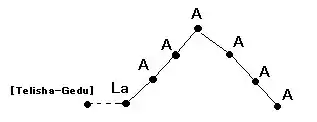| Telisha ketana/gedola | |||||||
|---|---|---|---|---|---|---|---|
| |||||||
| cantillation | |||||||
| Sof passuk | ׃ | paseq | ׀ | ||||
| etnakhta/atnakh | ֑ | segol | ֒ | ||||
| shalshelet | ֓ | zaqef qaton | ֔ | ||||
| zaqef gadol | ֕ | tifcha/tarkha | ֖ | ||||
| rivia/ravia’ | ֗ | zarqa | ֘ | ||||
| pashta | ֙ | yetiv | ֚ | ||||
| tevir | ֛ | geresh/gerish | ֜ | ||||
| geresh muqdam | ֝ | gershayim/shenei gerishin | ֞ | ||||
| karnei pharah | ֟ | telisha gedola/talsha | ֠ | ||||
| pazer (gadol) | ֡ | atnah hafukh | ֢ | ||||
| munakh/shofar holekh | ֣ | mahapakh/shofar mehupakh | ֤ | ||||
| merkha/ma’arikh | ֥ | merkha kefula/terei ta’amei | ֦ | ||||
| darga | ֧ | qadma | ֨ | ||||
| telisha qetana/tarsa | ֩ | yerah ben yomo | ֪ | ||||
| ole | ֫ | illuy | ֬ | ||||
| dehi | ֭ | zinor | ֮ | ||||
Telisha (Hebrew: תְּלִישָא) is a cantillation mark found in the Torah, Haftarah, and other books of the Hebrew Bible. There are two versions of the Telisha: Telisha ketana (תְּלִישָא קְטַנָּה) and Telisha gedola (תְּלִישָא גְּדוֹלָה), the latter of which has a longer melody. The Telisha trope can occur independently or can follow a Pazer or one of several other trope sounds. The Telisha ketana must be followed by a Kadma.[1]
The Hebrew word תְּ֠לִישָא translates into English as detached. This is because they are never linked to the following note as a single phrase. קְטַנָּה refers to little (the shorter note) and גְדוֹלָה to great (the longer note).
The Telisha gedola can be found in the Torah 266 times.[2] The Telisha ketana occurs 451 times.[3]
Total occurrences
| Book | Telisha ketana |
Telisha gedola |
|---|---|---|
| Torah | 451[3] | 266[3] |
| Genesis | 92[3] | 51[3] |
| Exodus | 87[3] | 42[3] |
| Leviticus | 71[3] | 56[3] |
| Numbers | 88[3] | 50[3] |
| Deuteronomy | 113[3] | 67[3] |
| Nevi'im | 413[4] | 238[4] |
| Ketuvim | 350[4] | 335[4] |
Melody
While the names "Telisha Ketana" and "Telisha Gedola" are 6 syllables each, they are usually applied to words with far fewer syllables, often just one. In one-syllable words, only the notes leading to and from the peak are included. In multiple-syllable words, the additional syllables are recited at the level of the first note leading to the peak.
Telisha Ketana

Telisha Gedola

References
- ↑ A compendious grammar of the Hebrew language By G. F. R. Weidemann, page 49
- ↑ Concordance of the Hebrew accents in the Hebrew Bible: Concordance ..., Volume 1 By James D. Price, page 241
- 1 2 3 4 5 6 7 8 9 10 11 12 13 Concordance of the Hebrew accents in the Hebrew Bible: Concordance ..., Volume 1 By James D. Price, page 6
- 1 2 3 4 Concordance of the Hebrew accents in the Hebrew Bible: Concordance ..., Volume 1 By James D. Price, page 5